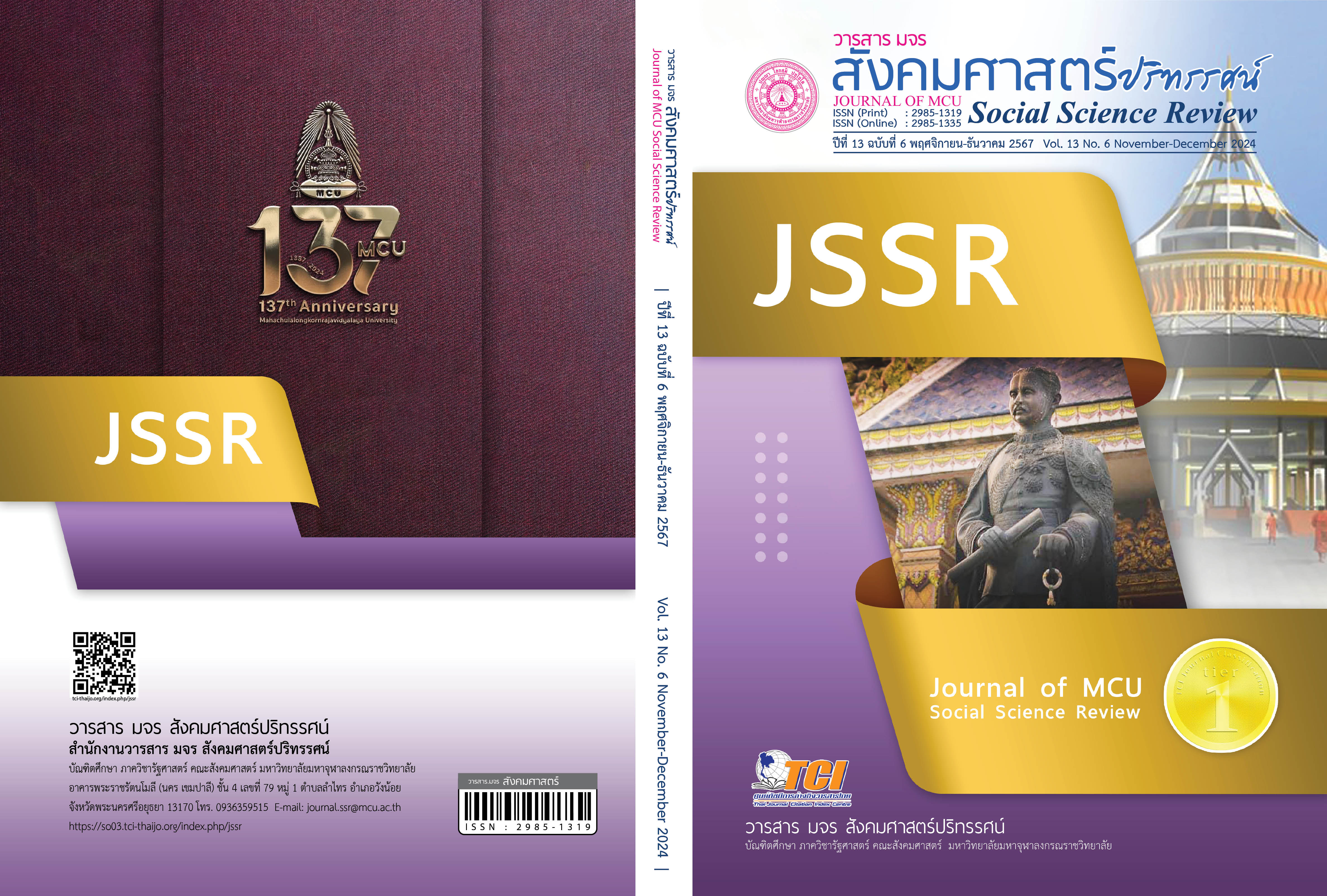การบริหารจัดการธุรกิจดูแลผู้สูงอายุตามแนวทางพุทธศาสนาของภาคเอกชนในกรุงเทพมหานคร
คำสำคัญ:
การจัดการ, ธุรกิจดูแลผู้สูงอายุ, หลักพรหมวิหาร 4บทคัดย่อ
บทความวิจัยนี้มีวัตถุประสงค์ 1. ศึกษาการบริหารจัดการธุรกิจดูแลผู้สูงอายุของภาคเอกชนในกรุงเทพมหานคร 2. ปัจจัยที่ส่งผลต่อการบริหารจัดการธุรกิจดูแลผู้สูงอายุของภาคเอกชนในกรุงเทพมหานคร 3. นำเสนอการบริหารจัดการธุรกิจดูแลผู้สูงอายุตามแนวทางพระพุทธศาสนาของภาคเอกชนในกรุงเทพมหานคร ดำเนินการวิธีวิจัยแบบผสานวิธี เก็บข้อมูลเชิงปริมาณโดยใช้แบบสอบถามกับกลุ่มตัวอย่างคือ บุคลากรในธุรกิจดูแลผู้สูงอายุในกรุงเทพมหานคร จำนวน 221 คน เก็บข้อมูลเชิงคุณภาพกับผู้ให้ข้อมูลสำคัญ จำนวน 18 รูปหรือคน วิเคราะห์ข้อมูลเชิงปริมาณโดยพรรณนาและอนุมาน และวิเคราะห์ข้อมูลเชิงคุณภาพโดยการวิเคราะห์เนื้อหา
ผลการวิจัยพบว่า 1. การจัดการธุรกิจดูแลผู้สูงอายุ โดยภาพรวมอยู่ในระดับมาก 2. ปัจจัยที่ส่งผลต่อการบริหารจัดการธุรกิจดูแลผู้สูงอายุ พบว่า 1. ปัจจัยส่งเสริม ประกอบด้วย เงิน วัสดุอุปกรณ์ การจัดการ และคน และ 2. หลักพรหมวิหาร 4 ประกอบด้วย เมตตา ความรัก มุทิตา พลอยยินดี อุเบกขา มีใจเป็นกลาง กรุณา ความสงสาร ส่งผลต่อปัจจัยที่ส่งผลต่อการบริหารจัดการธุรกิจดูแลผู้สูงอายุ อย่างมีนัยสำคัญที่ระดับ 0.05 3. การบริหารจัดการธุรกิจดูแลผู้สูงอายุตามแนวทางพุทธศาสนาของภาคเอกชนในกรุงเทพมหานคร พบว่า มีการนำหลักพรหมวิหาร 4 เข้ามาปฏิบัติเพื่อให้เกิดการจัดการธุรกิจที่ดี ประกอบด้วย 1. เมตตา ความรัก 2. กรุณา ความสงสาร 3. มุทิตา พลอยยินดี 4. อุเบกขา มีใจเป็นกลาง และนำปัจจัยส่งเสริมมาเป็นฐานเพื่อให้เกิดการจัดการธุรกิจที่ดีในการดูแลผู้สูงอายุของภาคเอกชนในกรุงเทพมหานคร ทั้งเรื่องบุคคล เงินทุน วัสดุอุปกรณ์ การบริหารจัดการ
เอกสารอ้างอิง
กรมพัฒนาธุรกิจการค้า, (2567). ธุรกิจดูแลผู้สูงอายุ บทวิเคราะห์ธุรกิจ ประจำเดือน มีนาคม 2564. สืบค้น 28 มกราคม 2567, จาก https://shorturl.asia/hJWVI
จรูญศักดิ์ สุนทรเดชา. (2562). การพัฒนารูปแบบการเฝ้าระวังพฤติกรรมสุขภาพผู้สูงอายุด้วยระบบเทคโนโลยีสารสนเทศของโรงพยาบาลส่งเสริมสุขภาพตำบล (ดุษฎีนิพนธ์ปรัชญาดุษฎีบัณฑิต สาขาวิชารัฐประศาสนศาสตร์). พระนครศรีอยุธยา: มหาวิทยาลัยมหาจุฬาลงกรณราชวิทยาลัย.
ชนะพงษ์ กล้ากสิกิจ. (2562). ประสิทธิผลการบริหารจัดการกองทุนหมู่บ้านและชุมชนเมืองในจังหวัดกำแพงเพชร (ดุษฎีนิพนธ์ปรัชญาดุษฎีบัณฑิต สาขาวิชารัฐประศาสนศาสตร์) พระนครศรีอยุธยา: มหาวิทยาลัยมหาจุฬาลงกรณราชวิทยาลัย.
นิอร ศรีสุนทร. (2559). การพัฒนารูปแบบการบริหารผลการปฏิบัติงานของสำนักงานเขตพื้นที่การศึกษาประถมศึกษา (ดุษฎีนิพนธ์ปรัชญาดุษฎีบัณฑิต สาขาวิชาการบริหารการศึกษา). ชลบุรี: มหาวิทยาลัยบูรพา.
พระพรหมคุณาภรณ์ (ป.อ. ปยุตฺโต). (2559). พจนานุกรมพุทธศาสตร์ ฉบับประมวลธรรม (พิมพ์ครั้งที่ 34). กรุงเทพฯ: มูลนิธิการศึกษาเพื่อสันติภาพ พระธรรมปิฎก (ป. อ. ปยุตฺโต).
ศิริพร ไชยชนะ. (2560). การบูรณาการหลักพุทธธรรมในการบริหารจัดการเพื่อส่งเสริมค่านิยมของการประปานครหลวง (ดุษฎีนิพนธ์ปรัชญาดุษฎีบัณฑิต สาขาวิชารัฐประศาสนศาสตร์) พระนครศรีอยุธยา: มหาวิทยาลัยมหาจุฬาลงกรณราชวิทยาลัย.
Thai PBS. (2024). Aging Society: Thailand has entered a fully aged society, in contrast to the fact that fewer children are being born. Retrieved January 23, 2024, from https://shorturl.asia/lc5On
Yamane, T. (1973). Statistic: An Introductory Analysis (3rd ed.). New York: Harper and Row.
ดาวน์โหลด
เผยแพร่แล้ว
รูปแบบการอ้างอิง
ฉบับ
ประเภทบทความ
สัญญาอนุญาต
ลิขสิทธิ์ (c) 2024 วารสาร มจร สังคมศาสตร์ปริทรรศน์

อนุญาตภายใต้เงื่อนไข Creative Commons Attribution-NonCommercial-NoDerivatives 4.0 International License.
เพื่อให้เป็นไปตามกฎหมายลิขสิทธิ์ ผู้นิพนธ์ทุกท่านต้องลงลายมือชื่อในแบบฟอร์มใบมอบลิขสิทธิ์บทความให้แก่วารสารฯ พร้อมกับบทความต้นฉบับที่ได้แก้ไขครั้งสุดท้าย นอกจากนี้ ผู้นิพนธ์ทุกท่านต้องยืนยันว่าบทความต้นฉบับที่ส่งมาตีพิมพ์นั้น ได้ส่งมาตีพิมพ์เฉพาะในวารสาร มจร สังคมศาสตร์ปริทรรศน์ เพียงแห่งเดียวเท่านั้น หากมีการใช้ภาพหรือตารางหรือเนื้อหาอื่นๆ ของผู้นิพนธ์อื่นที่ปรากฏในสิ่งตีพิมพ์อื่นมาแล้ว ผู้นิพนธ์ต้องขออนุญาตเจ้าของลิขสิทธิ์ก่อน พร้อมทั้งแสดงหนังสือที่ได้รับการยินยอมต่อบรรณาธิการ ก่อนที่บทความจะได้รับการตีพิมพ์ หากไม่เป็นไปตามข้อกำหนดเบื้องต้น ทางวารสารจะถอดบทความของท่านออกโดยไม่มีข้อยกเว้นใดๆ ทั้งสิ้น





